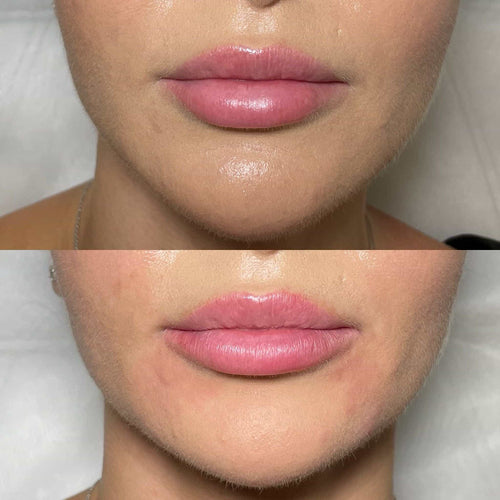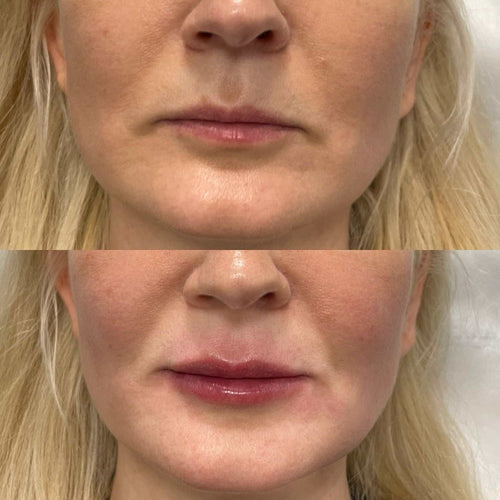Get Started with a Dermal Filler Consultation with Dr. Laura Geige
## Factors Affecting Filler Longevity
Numerous factors can influence how long dermal filler injections last in the tear trough area, a common site for facial aging.

One primary factor is the **type of filler** used. Hyaluronic acid (HA) fillers are commonly employed due to their biocompatibility and ability to attract and retain moisture. HA fillers generally last six months to two years, with varying durations depending on the specific product and individual factors.
Another key factor is the **individual’s metabolism**. Some people naturally metabolize filler faster than others, leading to shorter longevity.
**Injection technique** also plays a role. Precise placement of the filler in deeper layers of the tear trough can help prolong its effects.
Arrange a Dermal Filler Consultation at It’s Me and You Clinic with Dr. Laura Geige
The amount of filler injected directly correlates with longevity. Larger injections generally last longer.
**Sun exposure** can break down collagen and elastin fibers, accelerating the breakdown of filler.
Book a Dermal Filler Session with Dr. Laura Geige at It’s Me and You Clinic
Facial expressions, particularly repetitive movements around the eyes, can contribute to faster filler degradation.
**Lifestyle factors**, such as smoking and excessive alcohol consumption, can also impact filler longevity by hindering collagen production and promoting inflammation.
Maintaining a healthy lifestyle with good hydration and a balanced diet can potentially help extend the effects of dermal fillers.
### Dermal Filler Type
Dermal fillers are injectable substances used to add volume and fullness to various areas of the face, including the tear trough (the area under the eyes). Different types of dermal fillers are available, each with its own properties and longevity.
Here’s a breakdown of common dermal filler types used for tear trough treatment:

- Hyaluronic Acid (HA) Fillers:
- HA Filler Brands:**
- Juvederm
- Restylane
- Belotero
- Poly-L-lactic Acid (PLLA) Fillers:**
- Calcium Hydroxylapatite (CaHA) Fillers:
These are the most popular type of fillers used in tear troughs. HA is a naturally occurring substance in the body that helps to hydrate and plump skin.
They are reversible, meaning they can be dissolved with an enzyme called hyaluronidase if necessary.
HA fillers typically last between 6 to 18 months.
These fillers are made of a biodegradable synthetic material. They work by stimulating the body’s own collagen production, gradually adding volume over time.
They tend to last longer than HA fillers, typically 12 to 24 months.
These are biocompatible and biodegradable fillers that provide immediate volumization. They also stimulate collagen production but to a lesser extent than PLLA.
They generally last around 12 months.
The longevity of dermal filler in the tear trough can vary depending on several factors, including:
* Age: Younger skin tends to hold filler better.
* **Skin Type:** Thinner skin may require more frequent touch-ups.
* Lifestyle Habits: Sun exposure, smoking, and excessive alcohol consumption can break down filler faster.
* **Filler Choice:
As discussed above, different fillers have varying lifespans.
Hyaluronic Acid Fillers
Other Filler Types
Lifestyle and Habits
Beyond hyaluronic acid fillers, a variety of other dermal fillers are available for treating tear troughs. These include:
• **Calcium Hydroxylapatite:** This biocompatible and biodegradable filler provides a more structural support compared to hyaluronic acid, making it suitable for deeper hollows.
• **Poly-L Lactic Acid (PLLA):** This collagen-stimulating filler gradually breaks down over time, encouraging natural collagen production for long-lasting results.
• **Radiesse:** Similar to PLLA, Radiesse is a calcium-based filler that stimulates collagen growth and provides a lifting effect.
The longevity of any filler, regardless of type, depends on several factors:
- Filler Type: As mentioned, some fillers like PLLA are designed to last longer than hyaluronic acid fillers.
- Treatment Area: Tear troughs tend to have thinner skin and less supporting tissue, which can lead to faster filler absorption compared to areas like cheeks or lips.
- Individual Factors: Metabolism, skin elasticity, sun exposure, smoking habits, and even genetics can influence how long a filler lasts.
- Lifestyle Habits:**
- Sun Exposure: Excessive sun exposure breaks down collagen, leading to faster filler breakdown.
- Smoking: Nicotine constricts blood vessels, hindering circulation and reducing collagen production, ultimately shortening filler duration.
- Alcohol Consumption: Alcohol can dehydrate the skin, making fillers less effective and potentially causing premature breakdown.
- Hydration:** Staying well-hydrated helps keep skin plump and supports overall skin health, which can benefit filler longevity.
- Skincare Routine:**
- Filler Type:
- HA fillers come in various formulations with different cross-link densities. Thicker, more heavily cross-linked fillers tend to last longer than thinner, more fluid ones.
- Individual Metabolism: People who metabolize substances faster may experience shorter-lasting results.
- Lifestyle Choices:
- Smoking, excessive sun exposure, and certain medications can accelerate filler breakdown.
- Skin Elasticity: Individuals with tighter skin may see longer-lasting effects as the filler integrates more effectively.
Certain lifestyle choices can impact the longevity of your tear trough filler:
A consistent skincare regimen with antioxidants, retinol (used cautiously), and gentle cleansers can promote collagen production and protect your skin from damage, indirectly enhancing the results of your tear trough filler.
Facial Expressions
Sun Exposure
Smoking
Maintenance and TouchUps
Tear trough filler injections are a popular cosmetic procedure designed to address under-eye hollows and wrinkles, creating a more youthful and refreshed appearance. The longevity of these results varies depending on several factors, including the type of filler used, the individual’s metabolism, lifestyle choices, and skin elasticity.
On average, tear trough filler can last anywhere from 6 to 18 months. Hyaluronic acid (HA) fillers, which are most commonly used in this area, attract and hold water, plumping up the under-eye hollows and smoothing out fine lines. Over time, the body naturally breaks down HA, leading to a gradual fading of the results.
Several factors can influence the duration of tear trough filler:
Maintenance Touch-Ups:
To maintain the desired results, patients typically require touch-up injections every 6 to 18 months. These booster sessions replenish the diminishing HA, ensuring a smooth and rejuvenated appearance.
Choosing a Skilled Practitioner:
Selecting an experienced and qualified injector is crucial for optimal outcomes and safety. A skilled practitioner will assess your individual needs, determine the most appropriate filler type and placement, and minimize the risk of complications.
Recommended Frequency Results Expectations
- Polynucleotides Injectables Near Wrecclesham, Surrey - October 29, 2025
- Obagi Blue Peel Radiance Peel Near Carshalton, Surrey - October 25, 2025
- Non-Surgical Bum Lift: How It Fits Into The Modern Beauty Routine - October 25, 2025
